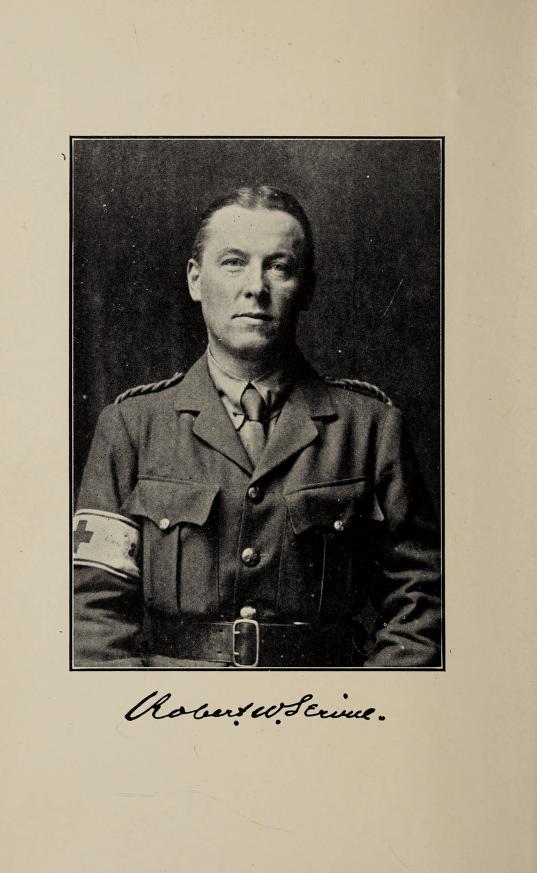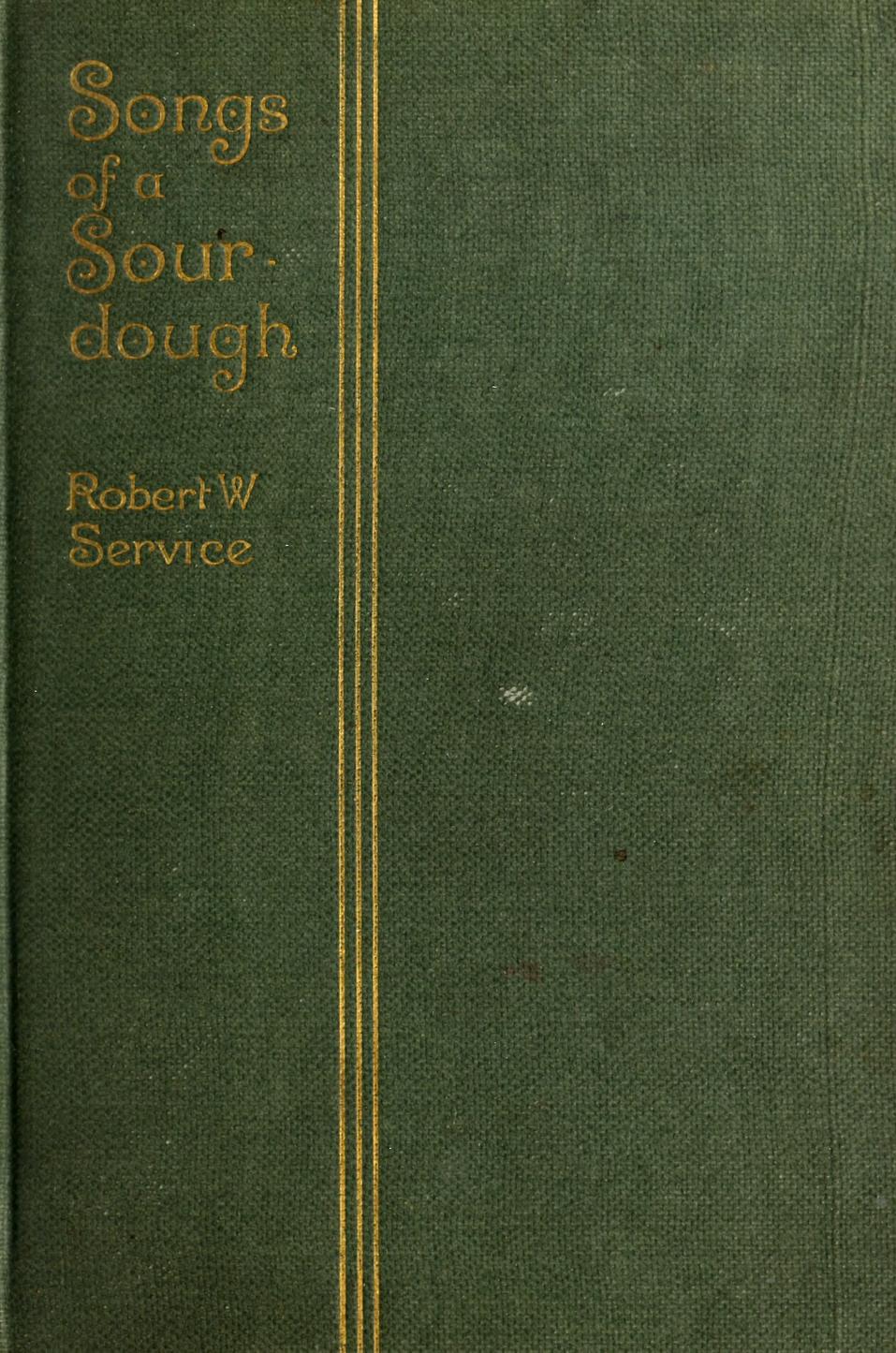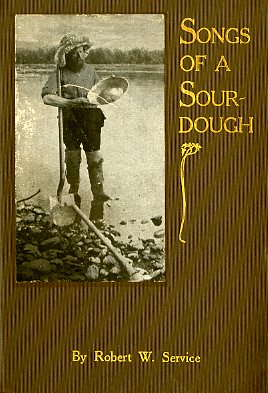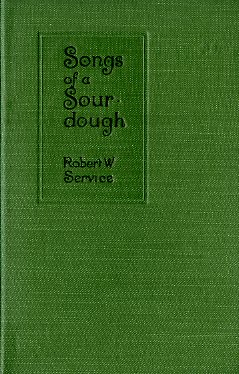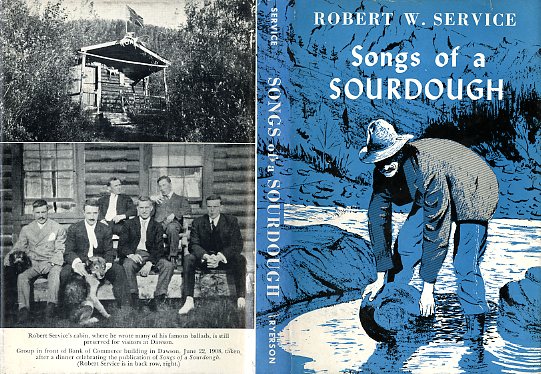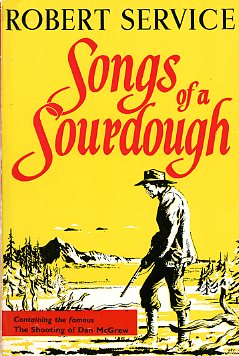In March 1909, a curious reader submitted a question to the New York Times “Queries and Answers” column. The reader wanted to know the meaning of “sourdough” in Songs of a Sourdough, the title of a book of poems written by Robert W. Service and first published in 1907 under the William Briggs imprint. While the word “sourdough” brings to mind a loaf of warm bread, fresh from the oven, that is made from fermented dough, it is also “a name applied to an old-timer in the Yukon,” someone who has successfully passed the winter in the North and could often be easily identified because the lonely winters forced him to develop a habit of talking to himself.1 Much like his verse, the very title of Service’s bestselling collection immediately linked him to Canada.

Poet and novelist Robert William Service (1874-1958) was born in England and educated in Scotland. He immigrated to Canada in 1894, where he worked at the Canadian Bank of Commerce2 as a teller in Victoria, British Columbia and later in Whitehorse, Yukon.3 While living in the Yukon, Service began to write about his experiences in “the wilderness” and the “daily events of frontier life.”4 Many of the poems inspired by Service’s time in the Yukon, such as “The Law of the Yukon” and “The Shooting of Dan McGrew,” became his best-known works and shaped the myth of life in Canada in the late nineteenth and early twentieth centuries.5
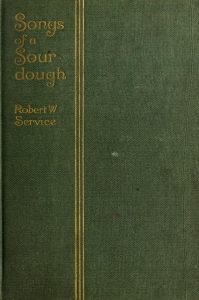
After a successful public reading, Service compiled a selection of twenty-seven poems that he planned to share with family and friends.6 He sent the manuscript to the Methodist Book and Publishing House and was surprised when it was quickly accepted for publication.7 What was intended as a collection for a handful of family members and friends became an unprecedented success in Canadian publishing history. Prior to the book’s publication in Canada on 4 June 1907, Songs of a Sourdough sold out two advanced printings, which were followed by three more printings of the same edition.8 After astounding sales in the spring of 1907, it was decided that Songs of a Sourdough was also likely to find success in the United States.9 As a result, an expanded American edition of Songs of a Sourdough, which included seven new poems, was published under the title The Spell of the Yukon and Other Verses by Barse and Hopkins of New York. In the United States, The Spell of the Yukon and Other Verses was reissued frequently; a number of subsequent Canadian editions also carried this title.10
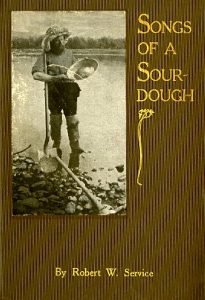
The poems in Songs of a Sourdough value the natural world over urbanization and materialism11 and emphasize the “manly”12 and rugged qualities supposedly required to survive in the North. They address the beauty of nature; the difficulties of working and surviving in a harsh landscape; and the violence that comes with adventure and war. Often, they set characters “on a quest involving challenge, struggle, [and] hardship … Those who succeed (and some who die) are real men … heroes … [who form a] quasi-religious Brotherhood of the North.”13 In “The Shooting of Dan McGrew” and “The Cremation of Sam McGee,” as well as “Fighting Mac,” Service creates memorable characters and events filled with intensity and action. In such poems, the modern sourdough is both hero and survivor of the North.14
“The Spell of the Yukon” explores the challenges of living in the North and the dangers of mining for gold. Despite the cruel climate and rugged landscape, the poem evokes the beauty of the Yukon and the feeling of satisfaction in being able to build a fulfilling life in this setting. The final lines of the poem are uplifting; they unveil the spell cast by the Yukon and convey a profound love of the North:
Yet it isn’t the gold that I’m wanting
So much as just finding the gold.
It’s the great, big, broad land ’way up yonder,
It’s the forests where silence has lease;
It’s the beauty that thrills me with wonder,
It’s the stillness that fills me with peace.15
According to Martin Bucco, Service views “the Northland ambivalently – loving its freshness and freedom, hating its famine and scurvy … yet is awed by it all.”16
Well before publication of Songs of a Sourdough, various newspapers were writing in anticipation of its release. In January 1907, the Canadian Courier announced the scheduled publication17 and in February issued an early review, in which Service was praised as “an original and versatile writer”18 whose verse resembled that of Rudyard Kipling. In May 1907, the Daily News reported on the forthcoming publication and printed “The Spell of the Yukon.”19
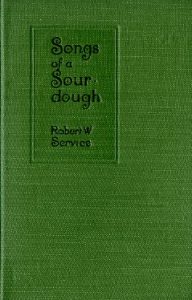
In June 1907, the Weekly Star in Whitehorse publicized the work and noted that the volume “is being universally praised from one end of the Dominion to the other and Mr. Service is referred to as the coming poet of Canada.”20 By January 1908, it was revealed in Saturday Night that London publisher T. Fisher Unwin would also bring out Songs of the Sourdough.21 In May 1908, Putnam’s and the Reader proclaimed that 12,800 copies had been issued within a year of its release.22
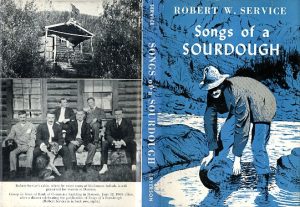
Despite the largely positive reception, some critics dismissed Songs of a Sourdough as “naive, banal, and facile.”23 In 1909, the Sewanee Review issued an unfavourable review: “To us, to speak quite plainly, it seems ragtime verse. And we are yet unconvinced that a barrel organ tune is the fit means of memorializing the crude and terrible experiences of men face to face with the wilderness and the Arctic cold.”24 Generally, however, Songs of a Sourdough, which favoured accessible themes and rhythmic style over the “pretensions of classical form and metre,”25 was well-received.
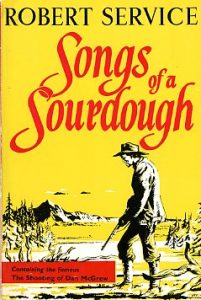
Although a complete history of publication remains difficult to trace, it is clear that Songs of a Sourdough launched Service’s career. He went on to become one of the Methodist Book and Publishing House’s most notable authors and Songs of a Sourdough “the cornerstone of a long and profitable publishing career in Canada, the United States, and Great Britain,” which allowed publishers like T. Fisher Unwin, amongst others, to “rely on Service’s work to sell to the mass market that increasing literacy had created.”26 Over the years, after forty seven impressions and multiple editions – issued in Canada, the United States, and the United Kingdom27 – Songs of a Sourdough sold a staggering 500,000 copies.28
As Witter Byner observes, Songs of a Sourdough was largely “ignored by the critics,” but it was also “a poetic phenomenon,”29 so popular with readers that it helped define a literary market that catered to the taste of its broad audience. The sustained success of Songs of a Sourdough was due also to productive relationships between Canadian, American, and British publishers.30 That Songs of a Sourdough is still in print – various editions are in circulation – and remains the subject of rigorous academic study confirms its significance as “one of the most enduring creative representations of Canadian life”31 in the North.
1 “Queries and Answers,” New York Times 13 March 1909: 154.
1 David Evans, “Robert William Service,” Canadian Encyclopedia. Accessed 23 October 2019, https://www.thecanadianencyclopedia.ca/en/article/robert-william-service.
3 Peter J. Mitham, “Returning to Roost: The English Publication of Robert W. Service,” Book Collector (Winter 1999): 521-40.
4 Mitham, “Returning to Roost.”
5 Mitham, “Returning to Roost.”
6 Mitham, “Returning to Roost.”
7 Mitham, “Returning to Roost.”
8 Mitham, “Returning to Roost.”
9 Mitham, “Returning to Roost.”
10 Mitham, “Returning to Roost.”
11 Mitham, “Returning to Roost.”
12 Mitham, “Returning to Roost.”
13 Martin Bucco, “Folk Poetry of Robert W. Service,” Alaska Review 2.1 (Fall 1965): 16-26.
14 Bucco.
15 Robert W. Service, Songs of a Sourdough (Toronto: William Briggs, 1907) 18.
16 Bucco.
17 Peter J. Mitham, Robert W. Service: A Bibliography (Newcastle, Delaware: Oak Knoll Press, 2000) 279.
18 Mitham, Robert W. Service 367.
19 Mitham, Robert W. Service 367.
20 Mitham, Robert W. Service 279-80.
21 Mitham, Robert W. Service 280.
22 Mitham, Robert W. Service 281.
23 Bucco.
24 Mitham, Robert W. Service 368.
25 Mitham, “Returning to Roost.”
26 Mitham, “Returning to Roost.”
27 Peter J. Mitham, “Publication of Songs of a Sourdough,” Papers of the Bibliographical Society of Canada 34.1 (Spring 1996): 13-61.
28 Witter Byner, “Poetry from the Trenches,” Dial 61.731 (14 December 1916): 531.
29 Byner 531.
30 Mitham, “Publication of Songs of a Sourdough.”
31 Mitham, “Returning to Roost.”





